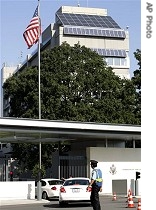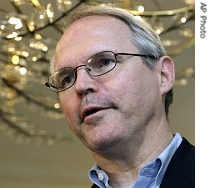2007年VOA标准英语-US, North Korea Meet on Nuclear Issue, Normaliz(在线收听)
Geneva
01 September 2007
The United States and North Korea are holding bilateral talks in an ongoing process aimed at disabling North Korea's nuclear facilities. This is the latest in a series of working group sessions preparing the ground work for all-important six-party talks that will take place later this month. The members include the two Koreas, China, Russia, the United States and Japan. Lisa Schlein reports for VOA from Geneva where the bilateral talks are taking place.
 |
| Vehicles enter the U.S. mission in Geneva, Switzerland, prior to the bilateral talks between the U.S. and North Korea, 1 Sept 2007 |
Upon his arrival in Geneva, the chief North Korean negotiator said he hopes the meeting will be positive. His American counterpart told journalists he is hopeful progress will be made toward scrapping North Korea's nuclear arsenal.
Chief U.S. negotiator, Assistant Secretary of State Christopher Hill, said the two delegations will be working on implementing the February 13 agreement.
That deal, reached by the six parties, obliges Pyongyang to disable its nuclear facilities and declare all of its nuclear program. In exchange, North Korea would receive 950,000 tons of heavy fuel oil or equivalent aid and other economic and political benefits.
In July, North Korea closed its main nuclear facility. Hill said he is optimistic the weekend talks with North Korean officials will help the two sides agree on how to begin declaring and disabling North Korea's nuclear programs.
 |
| Christopher Hill speaks during a press briefing about a bilateral meeting with North Korean envoys in Geneva, Switzerland, 31 Aug. 2007 |
"That involves building relations not only between the DPRK but also between the DPRK and other countries and between some of those other countries. So that is why we are trying to address some of the underlying causes of tension in the region," he said.
One issue concerns the abduction decades ago of Japanese citizens by North Korea. Hill says the resolution of that problem is on the bilateral agenda.
He says the six parties have created a mechanism to lessen such tensions and to build confidence among the nations. He says Russia has been working hard to ensure the process will be a success when the six parties meet.
"I hope that at the end we will not only have dealt with the terrible problem of nuclear weapons, but also the problem of making sure that this neighborhood produces not only some of the world's finest products but also Northeast Asia can produce also peace and security," he said.
Hill said he hopes North Korea will declare and disable all of its facilities by the end of the year, and then begin a final phase in 2008, destroying all of its nuclear weapons.
Hill says a successful outcome of the next six-party talks could eventually lead to a peace conference on the Korean peninsula that would result in a genuine peace agreement. This would replace the armistice that ended the Korean War in 1953.
He says other benefits could be a resumption of bilateral diplomatic relations and the removal of North Korea from the U.S. State Department's list of states that sponsor terrorism.